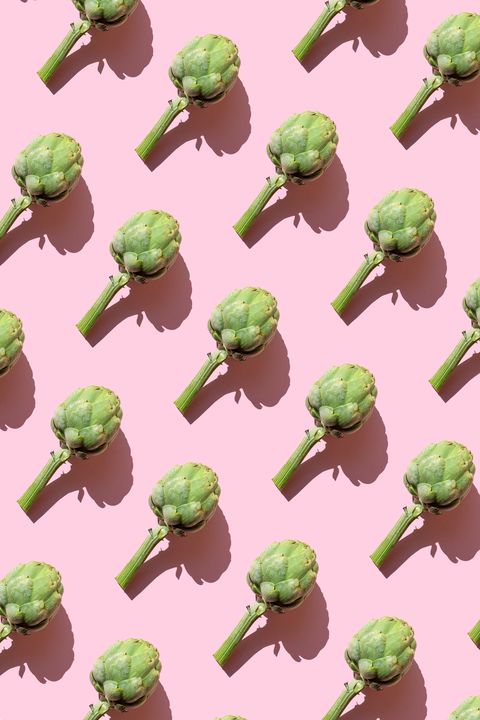
Crispin la valienteGetty Images
Sure, that artichoke dip you ate during the Super Bowl was yummy, but it was also hiding an under-appreciated superfood inside. Artichokes are jam-packed with nutrients our bodies need to function at their best and can support our health in lots of ways. “They’re really good for you,” says Sarika Shah, M.S., R.D.N., a nutritionist who specializes in helping Indian Americans live more healthfully. Read on to learn more about the health benefits of artichokes and how to incorporate them into your diet.
What are artichokes?
Most of us think of artichokes as weird-looking green vegetables, but did you know they’re technically the bud of a thistle flower? Native to the Mediterranean area, artichokes are now cultivated all over the world, from Argentina to China. You can even buy artichoke leaf extract, which is actually a concentrated capsule made from the leaf, stem and root of the plant, according to Shah.
Nutritional value of artichokes
Artichoke (medium) nutrition stats, according to U.S. Department of Agriculture,
- 13.4g carbohydrates
- 4g protein
- <1g total fat
- <1g saturated fat
- 6.91g fiber
- 1.27g sugar
- 474mg potassium
- 76.8mg magnesium
- 15mg vitamin C
“I believe artichokes are hidden gems,” says Shah. “Let’s just take a medium-sized one: It’s packed with fiber and has between 6 and 7 grams of fiber. That’s a lot — about 25% of the recommended daily intake. But then there’s something that most people don’t recognize — it has four grams of protein and they’re about 60 calories. That makes them a relatively low-calorie, high-fiber, low-carb, high-protein vegetable.”
If that’s not enough, artichokes are rich in vitamins C, K and folate, notes Lauren O’Connor, M.S., R.D., founder of Nutri Savvy Health and author of Heart-Healthy Instant Pot Cookbook. “They’re also a source of important minerals including potassium, magnesium, calcium and iron,” she adds. “Flavonoids — rutins, in particular, which are known for their antioxidant and anti-inflammatory properties — are found in the leaves, according to PDR Herbal Medicines, Third Ed.”
Health benefits of artichokes
- May improve liver health. “In a double-blind randomized trial of non-fatty liver disease patients, 600mg daily of artichoke extract resulted in improved liver function as well as reduce cholesterol and triglyceride levels,” says O’Connor. Some researchers say the benefits for the liver might stem from the artichoke’s ability to reduce oxidative stress and inflammation.
- May lower LDL and raise HDL cholesterol. While the studies mentioned above used artichoke leaf extract, the leaves themselves might promote healthy cholesterol levels on their own because of their high fiber content, says Shah. You see, fiber helps prevent cholesterol from being absorbed in your bloodstream and, according to the Mayo Clinic, you only need 5 to 10 daily grams of fiber to reap the benefits.
- May regulate BP. A 2021 review of studies found that ingesting artichoke leaf extract every day for 12 weeks resulted in lower blood pressure for people with hypertension. The key could be in the high potassium content of artichokes. However, it’s important to point out that the daily doses varied from one study to the next and it didn’t seem to improve blood pressure in people whose levels were healthy to begin with.
- May improve digestive health. There are a few ways that eating artichokes can support your digestive system. You know they have lots of fiber which helps keep you full and regular, but “artichokes are also high in inulin, which is a form of fiber that helps maintain a healthy gut,” says Shah. Inulin is a prebiotic, which means it’s a type of fiber that beneficial probiotic bacteria feed on in your bowel.
- May stabilize blood sugar. “High-fiber foods also support your diet in terms of blood-sugar control by slowing down the absorption of sugars,” says O’Connor. Some research suggests artichoke leaf extract may also be helpful for people with diabetes, but most studies are small or were performed on rodents instead of humans.
- May have anticancer effects. Some studies have shown that artichoke leaf extract is associated with stopping cancer cells from reproducing, but more research needs to be done to confirm the results. “Artichokes are high in antioxidants,” says Shah. “I don’t want to promote unverified research claims, but we do know antioxidants are great for the heart, reducing your risk of cancer and improving overall health.”
- May ease symptoms of IBS. Artichoke leaf extract may help calm IBS symptoms, some research shows. However, it may depend on what kind of IBS symptoms you have (such as constipation, diarrhea or both), according to Shah, because we don’t know the mechanism of action and sometimes fiber can aggravate IBS.
How to add artichokes to your diet
The unconventional look of artichokes can make them intimidating, but they’re really not difficult to prepare. “If you’re at a farmer’s market or your local grocery store, just pick up one — don’t get scared,” says Shah. If you only buy one, it’s not a big investment or too overwhelming. Once you get home, follow these three easy steps from Shah: Boil a few inches of water in a pot with lemon, salt and some garlic cloves. Wash the artichoke, slice off a half-inch of the pointed top with a knife, use kitchen scissors to trim the spiky point of each leaf so they’re all flat, and set it in a steaming basket in the heated pot for about 25 to 30 minutes.
“Then get your favorite dip — whether it’s aioli, mustard, Ranch or melted butter, I don’t care — and pour it over the artichoke,” says Shah. Peel off one leaf at a time and use your teeth to scrape and eat the soft, fleshy underside.
“Just eat slowly and enjoy it,” says Shah. “It takes some time and helps you slow down the quickness in what you eat. There’s so much texture — the leaf is a little tough and the inside of it is sweet and soft — and then there’s the flavor so there’s a lot you can connect with when you’re eating if you’re mindful.”
If steaming was a success, next time O’Connor recommends cutting the artichoke in half, grilling it with salt and olive oil and then squeezing a little lemon juice on top. Or, she says, cut out the heart from the middle of the artichoke, marinate it in olive oil and spices and place it on pizza or in a salad with feta, olives and dark leafy greens. “If artichoke is one more thing you bring into your rotation and you only have it once a month, kudos to you for trying it,” adds Shah. “I’m all about adding instead of taking out so if you can add something, enjoy it.”
Artichoke leaf extract safety and dosing
The dosing amounts studied in existing research varies widely from one trial to the next, so it’s hard to say exactly how much is safe to take — or effective. “If you’re going to take any extract supplement, especially something like artichoke leaf extract which we don’t know too much about, make sure you clear it with your primary care physician,” says Shah. In general, the extract is not recommended if you’re breastfeeding or pregnant or allergic to certain flowers like daisies, says Shah. Also, “if you have gallstones you don’t want to take it because the artichoke leaf extract will actually increase bile flow,” she says.
This content is created and maintained by a third party, and imported onto this page to help users provide their email addresses. You may be able to find more information about this and similar content at piano.io






No comments:
Post a Comment